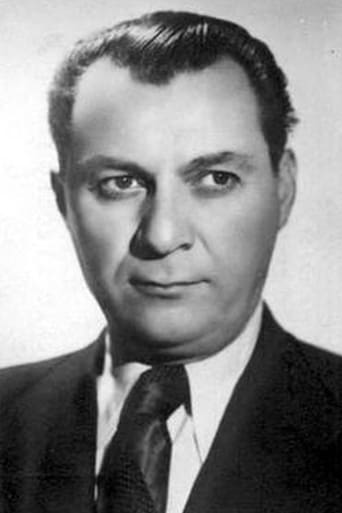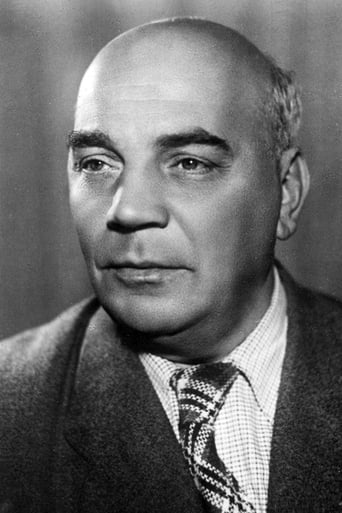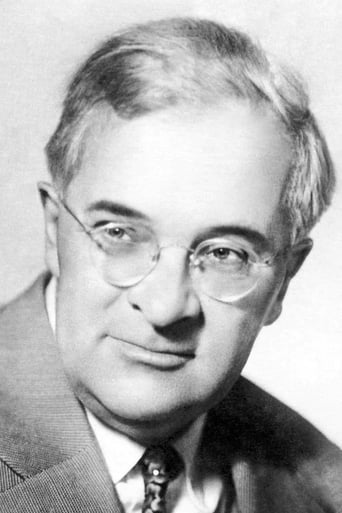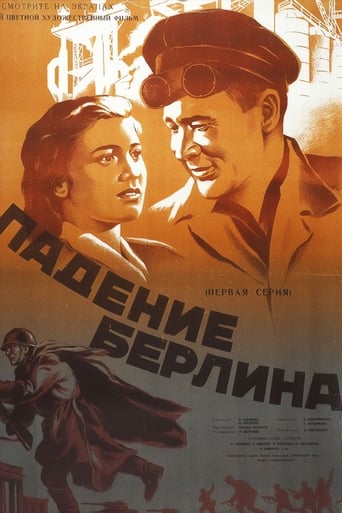
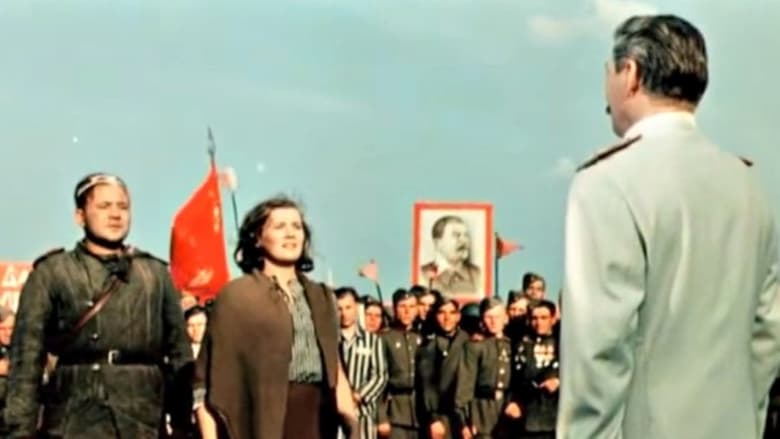
The Fall of Berlin (1950)
Surrounded by a few party officials, Alexei Ivanov, a stakhanovist smelter, is decorated by Stalin. The "Little Father of the Peoples" takes this opportunity to invoke threats of war.... One day, war indeed breaks out. Bombs fall on the field where Alexei finds himself in the company of the schoolmistress Natacha, his fiancée. Alexei joins the Red Army and soon becomes a sergeant. Fighting rages and German troops advance. Natacha is arrested and deported. But the tide turns decisively with the German defeat at Stalingrad. Now the major offensive against Hitler can begin.
Watch Trailer
Cast
Reviews
Must See Movie...
I like movies that are aware of what they are selling... without [any] greater aspirations than to make people laugh and that's it.
This story has more twists and turns than a second-rate soap opera.
Ok... Let's be honest. It cannot be the best movie but is quite enjoyable. The movie has the potential to develop a great plot for future movies
I purchased a DVD of this film in order to see a Soviet-made WW II film made during the peak of the "Stalin cult" and during the early years of the cold war. I wanted to see the impact of Soviet propaganda on WW II films at this time and therefore found it very interesting in that regard, although the film itself is somewhat muddled. It awkwardly weaves a love story between a simple Stakhanovite (a big producer in the steel mills) and a schoolteacher with the ebb and flow of the war with Nazi Germany, and lo and behold they are reunited (she was sent to Germany as a slave laborer) at the bottom of the conquered Reichstag in the heart of Berlin at the end of the war. And Stalin arrives at the end of the battle for Berlin to receive a grateful kiss from the schoolteacher at the Reichstag and receive the adulation of both the Soviet armies and of the captives of all nations liberated by the Red Army in their various languages. In addition, there are the "stock" characters beloved in Soviet demonology: The scheming British capitalist who intends to get strategic metals to the Reich from Sweden, the Vatican emissary to the Reich in full bishop's regalia who praises Hitler, the Nazi officer who feigns surrender only to throw a grenade at his Soviet captors. Churchill at Yalta is portrayed as scheming and untrustworthy; he asks Stalin to toast George VI to which the proletarian Generalissimo refuses. Hitler is portrayed in equal parts buffoonish and crazy, so much so that we wonder, given this portrayal, how he was able to captivate and inspire, at least for much of the war, his generals and party comrades. Stalin, of course, is portrayed as calm and never fearful, and full of wisdom.But it should be noted that much of the military history is accurate. Although the film (obviously) does not cover Stalin's decapitation of the Red Army in the great purge of 1937 and his refusal to listen to Soviet intelligence as well as warnings from Churchill that a Nazi invasion of the Soviet Union was imminent in the spring of 1941, which were both disastrous for the Soviets, it does show his decision to stay in Moscow in the fall of 1941, when the Germans launched their "final offensive" against Moscow and much of his government was panicking. It's fair to say that remaining in Moscow improved the morale of the Red Army fighting only 30-40 km from the Kremlin. To expedite the conquest of Berlin, Stalin sets the demarcation line between Marshall Zhukov's 1st Belorussian Front and Marshall Konev's 1st Ukrainian Front right in the center of Berlin to foster a rivalry between the two commanders in capturing Berlin. We hear the denigration of the Reich's resistance against the Anglo-American armies while Nazi Germany fights fanatically against the invading Red Army (This was only true of the last weeks of the war when the Germans were desperate to surrender to the western allies and avoid the feared Russians.) The depiction of the fighting is very good in places, but looks stilted in others. An officer tells his fighting men that wherever we go: "Stalin is with us." The director had access to some five Soviet divisions. The massing of artillery at the April 16th offensive on Berlin (from the Oder River), complete with searchlights, looked impressive. I believe the 1st Belorussian Front had something like an artillery piece every 10 meters for miles! And the final assault on the Reichstag also looked very realistic. Even though the Reichstag hadn't been used since the fire of 1933, the Red Army viewed it as the ultimate symbol of Nazi Germany whose destruction meant the final extinction of the Reich.It should be noted that Marshall Zhukov is not treated well in this film. One scene is titled "Zhukov's Error", and when Stalin makes his fictional visit to Berlin after the Reichstag's been taken, he meets three generals (Konev, Rokossovsky, and Chuikov) but not Marshall Zhukov, his most successful commander. Stalin feared Zhukov's popularity after the war, and he was subsequently demoted to minor postings by the time the film was made in 1949.The film ends with Stalin "dropping out of the clouds" from his magnificent airplane (reminiscent of Hitler in Leni Riefenstahl's "Triumph of the Will", as many have noted) and spreading his benevolence to the assembled masses in the heart of Berlin. Our "Engineer of Souls" pronounces his wish for "peace and happiness" for all mankind. In actuality, at the time of the events being depicted (1945) he was preparing another repressive crackdown on individual liberties, and at the time the film was made (1949) he was close to giving his approval to Kim II Sung to invade South Korea. Khrushchev always viewed the film's director, Mikheil Chiaureli, as a hack, and the film was withdrawn from circulation during the de-stalinization campaign beginning in 1953. But 38 million Soviet citizens watched it in upon its release in 1950 and it remains an excellent example of Soviet historiography.
Perhaps not the most sophisticated film ever made about World War II, but this 1949 Soviet film is a rousing, solid, popular piece of filmmaking. Reportedly made as a present for Stalin's 70th birthday, who took great interest in its production, it was made with considerable production values (for that time) and in great Agfacolor film, taken as war reparation from the Germans. It's a propaganda film alright, but is very well made. As far as I know this was also the first fiction film dealing with the fall of Berlin (though the film, despite its title, deals with all the war in the eastern front, starting from the German invasion of Russia and not just its ending). I'm sure its intended audience – the Soviet masses who just have been through WW2, appreciated the movie. Hitler and his minions (who all speak in Russian in the film) are portrayed as grotesque, pathetic buffoons – but this is not necessarily a bad thing since they are the comic relief of the movie. Also fun is the portrayal of Roosevelt and Churchill at the Yalta conference, the American president is shown as naive and slightly befuddled, the British premier a mean, conniving old man. Stalin, meanwhile, is portrayed through the film as a wise, gentle, all knowing commander leading his country into victory (never mind his well recorded nervous breakdown at the start of Operation Barbarossa). Summing up, despite some historical inaccuracies, this is a very good film, especially for those interested in World War II (note: in this review, I deal with both part I and part II, since the division of the movie in two halves is artificial).
There are certain subjects that do not lend themselves to mockery. One of those subjects is Adolf Hitler and the Nazis. Any movie that tries to treat Hitler and the Nazis as a bunch of buffoons is a movie that is destined to fail dramatically, and thus this movie is a supreme failure. What is ludicrous about this movie is not so much its stilted portrayal of Adolf Hitler but the fact that anyone would even want to go out of their way to try to reduce Adolf Hitler to a caricature and an item for derision. Hitler's career is a matter of historical fact which requires no further literary embellishment. Hitler's policies of deceit, aggression, war and genocide speak for themselves. What more can be said or added about what he said and did or the havoc and suffering he caused? Treating Adolf Hitler and the Nazis as a joke is historically unsupportable. It would be like mocking a serial killer. Mock all you want, the killer is still a killer. To reduce the personality of Adolf Hitler to the level of audio and visual clichés simply does not convey his cunning, his destructiveness, his demagoguery and depravity. Adolf Hitler was anything but a joke. Any person who could smile and laugh around children, extend the most gracious courtesies to his personal guests, laugh and joke with his closest staff, indeed, even root for his favorite team in the Olympics, while AT THE SAME TIME plotting to start a war and exterminate millions of people is the kind of chilling personality that defies superficial treatment on the screen, or anywhere else for that matter. Hitler ranting and raving? If this was all that Hitler was about, then maybe it would be funny, but Hitler was no mere screaming buffoon and to try to pass him off as being that does not do justice to the millions of victims who succumbed to his policies. A screaming buffoon could have never done what Hitler did. To lead an entire nation to war and to pursue policies that directly affected the course of history required a degree of determination and self-control that this movie fails to attribute to the Fuhrer. By reducing Hitler to a mere caricature of a dictatorship undermines the basic premise of the movie, that the Soviet Union under the leadership of Joseph Stalin was a strong, viable and credible nation, for how strong does a country and the political leadership need to be to defend itself against somebody that according to the movie is nothing more than a pathetic joke? This has to be one of the worst propaganda movies ever made. Hitler was already dead, World War Two was already history, Nazi Germany had already been defeated and obliterated from the political map, yet the Soviet Union decided to produce what has to be one of the worst movies ever made, which is saying a lot in a era of bad movies stretching back to the dawn of the age of Holloywood. The acting is poor, the story is pure Soviet propaganda bombast, the cinematography is almost laughable. But what is particularly annoying is its portrayal of Adolf Hitler as a caricature. The portrayal of Adolf Hitler is so ridiculously superficial that it reduces Hitler to an item of mockery and derision which is neither necessary or true. There is one thing that can be said about Adolf Hitler: what he did and what he stood for inspires contempt, scorn and outright rejection, but not derision. There is nothing funny about Hitler's decision to go to war and invade the Soviet Union. Nor is the portrayal of Adolf Hitler as some kind of screaming, argumentative hysterical malcontent historically accurate or dramatically strong. Historical evidence seems to suggest that Hitler was no more prone to fits of anger than anyone else and that he followed a plan of action that was well thought out and meticulously implemented with the full support of the entire Nazi Party and an entire nation, including its army, naval and air force, whose resources were mobilized to achieve what Hitler wanted. In Mein Kampf Hitler put the whole world on notice as to what he intended to do if he had the power and that the nobody took him seriously is anything but funny; it is tragic. This movie makes fun of Hitler but what Adolf Hitler did inspires anything but laughter. He wasn't funny when he was alive and to make fun of him after he's dead is more of a reflection of the mentality of whoever made this movie than on the Adolf Hitler himself.One question this movie raises is why would anyone even want to make such a movie? To mock and deride at Hitler four years after the end of World War Two and Hitler's death seems rather pointless and a mere exercise in displaced rage. By 1949 the career of Adolf Hitler was already well documented and spoke for itself. The whole world knew what he had done and was still in the process of recovering from the consequences of his actions. But for a movie company to actually spend time and money to produce a movie that portrays Adolf Hitler and his Nazi cronies as corrupt, effete, irresponsible sycophants isn't saying anything that was not already public knowledge and merely confirmed the obvious. Now if this movie was intended to be a satirical comedy or a farce, then there might be a valid place for a goofy, campy portrayal of Hitler. However this movie apparently was not a comedy or a satire, which makes the movie completely irrelevant and an exercise in cinematic mediocrity.
A Birthday Present that finally answers the age old question of what to get the man who has everything. This film was presented to Stalin on his 70th birthday and is the archtypical Stalin Film. It is intriguing insight into the mindset of the man who ruled and terrorized 1/5 of all humanity and 1//2 of Europe by the film's 1949 release date. The acting, especially the Aliosha and Natasha love plot tied in with Stalin is poorly acted but makes all sense when you look at how Aliosha looks to Stalin for advice, because truth be told this film is a romance for Stalin. The special effects and lighting are excellent for a 1940s film and it is shot in a grand scale that matched the efforts of Kolberg, Gone with the Wind, and the 1926 Ben Hur.The best parts of this film are the impressions of Churchill and Hitler. Minus Churchill speaking Russian, they have his lisp and mannerisms done exceedingly well. Hitler and Goering provide great charictatures and are humorously well done. At best its an intriguing insight into the delusions of madness that Stalin subjected his people to and at worst its a 2 hour festival of unintentional humor. I'd recommend it for any historian.
